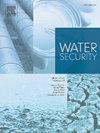加纳食物和水不安全对情绪困扰和整体健康的综合影响:横断面研究结果
IF 4.3
Q1 Earth and Planetary Sciences
引用次数: 0
摘要
水和粮食安全对健康和福祉至关重要。尽管全球在改善安全饮用水的获取和充足的健康营养膳食方面取得了进展,但不安全因素依然存在,造成了重大的公共健康问题。此外,我们对生活在水和食物不安全环境中的综合症知之甚少。本研究探讨了水和食物不安全之间的关系,以及它们对情绪困扰和总体幸福感的交互影响。我们以加纳为例,采用多阶段抽样技术进行了一次横断面家庭调查(n = 1,036),并采用多层次混合效应广义线性和物流模型(meglm 和 melogit)来分析结果变量。情绪困扰采用一般健康问卷(GHQ-20)进行测量,该问卷评估情绪困扰的几个方面,包括抑郁倾向、焦虑和社交障碍。我们发现,与没有经历水或食物不安全的家庭相比,中等水不安全家庭(aOR=1.79,p≤0.05)和严重食物不安全家庭(aOR=2.05,p≤0.05)报告情绪困扰的可能性分别更高。除主效应外,中度缺水和严重缺粮对情绪困扰也有显著的交互效应。同样,与既有水又有粮食保障的家庭相比,在主观幸福感方面,经历过中等程度水不安全和严重粮食不安全,以及经历过严重水不安全和严重粮食不安全,也分别有明显的交互效应。除了家庭层面的水和粮食不安全因素外,其他重要的情绪困扰和幸福感预测因素还包括收入充足性、住房安全和贫困。本文章由计算机程序翻译,如有差异,请以英文原文为准。
The syndemics of food and water insecurities on emotional distress and overall wellbeing in Ghana: Findings from a cross-sectional study
Water and food security are essential to health and wellbeing. Although globally, progress has been made in improving access to safe drinking water and adequate amounts of healthy and nutritious diets, insecurities remain, resulting in major public health concerns. Furthermore, we know little about the syndemics of living with both water and food insecurities. This study examines the relationship between water and food insecurities, as well as their interaction effects on emotional distress and overall wellbeing.
Using Ghana as a case study, we conducted a cross-sectional household survey (n = 1,036) using a multi-stage sampling technique and employed multilevel mixed effects generalized linear and logistics models (meglm and melogit) to analyze the outcome variables.
Participants subjective wellbeing was measured using a modified global wellbeing measure that follows a multidimensional approach. Emotional distress was measured using the General Health Questionnaire (GHQ-20) which assesses several aspects of emotional distress including predisposition to depression, anxiety, and social impairment.
We found that medium water insecure (aOR=1.79, p ≤ 0.05) and severe food insecure (aOR=2.05, p ≤ 0.05) households had higher likelihood of reporting emotional distress compared to households that did not experience either water or food insecurities, respectively. In addition to the main effects, there were significant interaction effects between experiencing medium water insecurity and severe food insecurity on emotional distress. Similarly, there were significant interaction effects between experiencing medium water insecurity and severe food insecurity as well as experiencing severe water insecurity and severe food insecurity on subjective wellbeing compared to households that were both water and food secure, respectively. In addition to water and food insecurities at the household level, other significant predictors of emotional distress and wellbeing included income adequacy, housing security and poverty.
Conceptualizing, measuring, and tracking the syndemics of food and water insecurities on emotional distress and overall wellbeing provides useful insight into the need for and efficacy of public health and global development interventions.
求助全文
通过发布文献求助,成功后即可免费获取论文全文。
去求助
来源期刊

Water Security
Earth and Planetary Sciences-Oceanography
CiteScore
8.50
自引率
0.00%
发文量
17
期刊介绍:
Water Security aims to publish papers that contribute to a better understanding of the economic, social, biophysical, technological, and institutional influencers of current and future global water security. At the same time the journal intends to stimulate debate, backed by science, with strong interdisciplinary connections. The goal is to publish concise and timely reviews and synthesis articles about research covering the following elements of water security: -Shortage- Flooding- Governance- Health and Sanitation
 求助内容:
求助内容: 应助结果提醒方式:
应助结果提醒方式:


